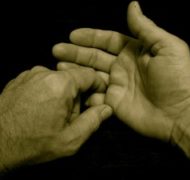Your Hands Tell Your Story
Blog / Produced by The High Calling
Your hands are two personal valets that wait on you with absolute commitment. They perform all of your mundane tasks with tender care. Tying shoes, buttoning shirts, brushing your teeth, and fixing your hair. Fluffing, patting, retrieving, holding, scratching, feeding, and soothing. Before you even know what you want, they spring into action. Your wish is their command. And they say you can’t get good help anymore!
It takes about five years to break in a pair of hands. At first they wiggle and grasp clumsily. Soon they learn to guide food toward your mouth, help you dress, and pull colorful things close to your eyes. Years six through ten are hard on the hands. You know how to use them, but you foolishly send them into harms way. Hands and fingers sustain a lot of injuries in those years. By the time you are fifteen, your hands have worked out most of the tasks they will do for you. All of your gestures are in place, and even your handwriting - such a telling and personal thing - has taken its final form. After that it’s just years and years of faithful service. As you age, your hands begin to take on the character of your life’s work. What we do with our lives is our vocation and calling. And it changes the appearance of our hands.
Van Zany Cox was my grandfather. He was the oldest of five children and picked cotton when he was a boy. His family lived in a boxcar during the hard years. His big break came when he got a job with an oil company, working in the fields. His hands were thick and strong and rough. They bore the unmistakable signs of hard labor. Nerve damage sustained in some accident took away much of the feeling in one of his hands. He enjoyed amazing his grandchildren by holding that hand over a candle. When old age finally overtook him, his huge hands seemed out of place on his shrinking frame. They hung at the end of his arms from thick wrists that stretched every watch band as far as it could go. Those hands that gripped steel and pulled chains were timid at the end. They were not made for the simple tasks he set them to in his last days. They shook and were awkward when he tried to wipe his mouth or bait a hook.
Our family embraced my grandfather's work ethic. There were no cotton fields in the suburbs of Houston, but I was sent into the yards of our neighbors with a lawnmower. In high school I loaded trucks with cases of oil. In college I swung a sledge hammer on a construction crew working on Interstate 10. My hands began to thicken, like my grandfather's. But then I moved into the world of the mind. After college came seminary, then church work, and then writing. My hands show the thickening signs of that early work, but their development was arrested before they became hard. My wife says that my hands are delicately rough. I have a few scars - an old gash and a cut on my thumb from a fifty-five gallon oil drum. But my hands are a mixture of strength and tenderness. These last twenty years they have typed and written and flipped through Bibles and baptized new believers. They are hard but nimble instruments. They are strong, but they can type seventy to eighty words a minute.
Sometimes when I am around my mother she grabs my hands and turns them back and forth, peering at them like a palm reader. I know she sees her father’s hands in mine. She likes to look at my hands and remember him. I like my hands. They are so familiar to me. I remember the hard labor of my early years and the changes that led me to different kinds of work than my grandfather knew. Not better work. Just different. We lived in different times and were called to different vocations. We are what we do. Some people don’t like the sound of that, but it really is true. Because what you do with your life says more about you than what you say. Words can lie, but the body and the hands do not. Your work is a sacred thing, a vocation. And because of your hands, you carry the story of your work with you all the days of your life.
Photo by Gordon Atkinson of his own hands. April 2010





